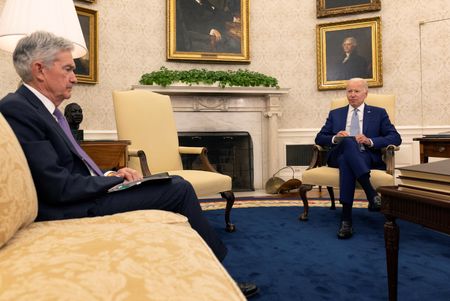

By Jeff Mason and Jarrett Renshaw
(Reuters) – U.S. President Joe Biden on Tuesday met with Federal Reserve Chair Jerome Powell to discuss historic inflation that’s draining American wallets, even as he assured the central bank chief he would have freedom from political interference.
“The president underscored to Chair Powell in the meeting what he has underscored consistently including today — that he respects the independence of the Federal Reserve,” White House National Economic Council Director Brian Deese said after the meeting, calling it “very constructive.”
Deese also nodded to the “transition” ahead for the U.S. economy as the Fed lifts interest rates to more normal levels to dampen demand and ease price pressures, slowing growth in the process.
“We have run this first leg of the race at a very rapid clip that has put us in the strong position relative to our peers, but this is a marathon and we have to move and shift to stable resilient growth,” Deese said. “We can actually take on inflation without having to sacrifice…all of those (labor market) gains.”
Biden’s dealings with Powell stand in sharp contrast to former President Donald Trump’s approach, which involved routinely castigating Powell for the Fed’s interest-rate decisions and even threats to fire him.
The meeting, the first between the two men since Powell’s confirmation for a second term by the Senate earlier this month, comes as rising gasoline, food and consumer goods prices have sent inflation to 40-year highs.
In brief remarks ahead of the meeting, Biden said he was meeting with Powell and U.S. Treasury Secretary Janet Yellen to “discuss my top priority, and that is addressing inflation.”
Stock indexes on Wall Street closed lower [.N]
NOT A TIME FOR NUANCES
The U.S. economy had its strongest growth in nearly four decades in 2021, after the government poured trillions of dollars in COVID-19 relief into the economy, and the Fed kept borrowing costs near zero. The rescue efforts helped drive unemployment down to 3.6% from its pandemic-era high of 15%, but also revved up consumer spending that has contributed to higher prices.
A Labor Department report earlier this month showed unemployment rolls shrinking to the lowest level in 52 years, helping to drive wage growth.
The Fed hopes inflation will moderate on its own, as companies sort out supply chain issues complicated by the pandemic, for example, and consumers shift spending toward services.
But Powell has also made clear that the Fed is no longer counting on that, and will ratchet interest rates as high as needed.
He sees high inflation as the chief economic risk facing the country, and controlling it as the Fed’s top priority during his second term, even if the process proves painful to households and firms, and pushes the unemployment rate a bit higher.
The Fed has already raised interest rates by 3/4 of a percentage point this year. Most Fed policymakers say they expect to continue to raise rates until they reach around 2.5% by the end of this year, and further if needed. The planned rate hikes will include a half percentage point increase at both their June and July meetings.
For Biden and the Democratic party that could mean a difficult midterm election season, where they are trying to maintain control of the Senate and House of Representatives. Biden in June plans a media blitz to make the case to Americans that the economy is strong.
U.S. consumer price growth slowed in April as gasoline prices eased off record highs, suggesting that inflation has probably peaked, though it is likely to stay hot for a while and keep the Federal Reserve’s foot on the brakes to cool demand.
Powell earlier this month said that despite some encouraging signs that price pressures may be peaking, the current environment is “not a time for tremendously nuanced readings of inflation,” and U.S. central bank officials will keep tightening policy until inflation comes down in “a convincing way.”
(Reporting by Jeff Mason, Steve Holland, and Jarrett Renshaw; Additional reporting by Trevor Hunnicutt and Ann Saphir; Editing by Alison Williams, Heather Timmons, Mark Porter and Andrea Ricci)

